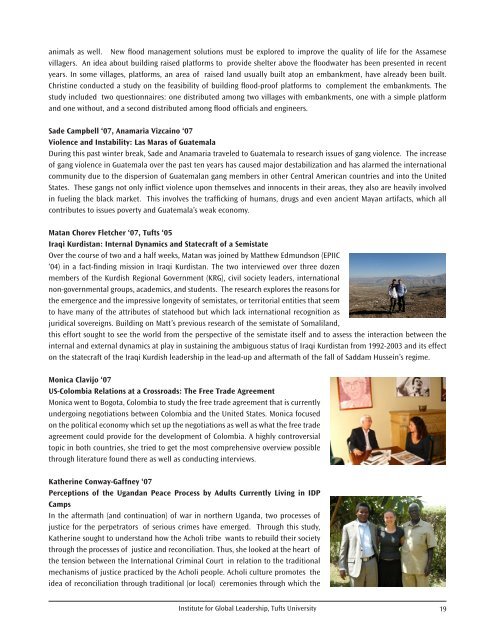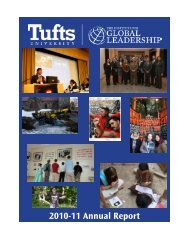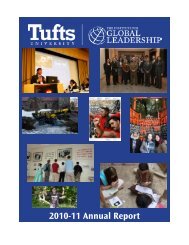Download - Institute for Global Leadership
Download - Institute for Global Leadership
Download - Institute for Global Leadership
Create successful ePaper yourself
Turn your PDF publications into a flip-book with our unique Google optimized e-Paper software.
animals as well. New flood management solutions must be explored to improve the quality of life <strong>for</strong> the Assamese<br />
villagers. An idea about building raised plat<strong>for</strong>ms to provide shelter above the floodwater has been presented in recent<br />
years. In some villages, plat<strong>for</strong>ms, an area of raised land usually built atop an embankment, have already been built.<br />
Christine conducted a study on the feasibility of building flood-proof plat<strong>for</strong>ms to complement the embankments. The<br />
study included two questionnaires: one distributed among two villages with embankments, one with a simple plat<strong>for</strong>m<br />
and one without, and a second distributed among flood officials and engineers.<br />
Sade Campbell ‘07, Anamaria Vizcaino ‘07<br />
Violence and Instability: Las Maras of Guatemala<br />
During this past winter break, Sade and Anamaria traveled to Guatemala to research issues of gang violence. The increase<br />
of gang violence in Guatemala over the past ten years has caused major destabilization and has alarmed the international<br />
community due to the dispersion of Guatemalan gang members in other Central American countries and into the United<br />
States. These gangs not only inflict violence upon themselves and innocents in their areas, they also are heavily involved<br />
in fueling the black market. This involves the trafficking of humans, drugs and even ancient Mayan artifacts, which all<br />
contributes to issues poverty and Guatemala’s weak economy.<br />
Matan Chorev Fletcher ‘07, Tufts ‘05<br />
Iraqi Kurdistan: Internal Dynamics and Statecraft of a Semistate<br />
Over the course of two and a half weeks, Matan was joined by Matthew Edmundson (EPIIC<br />
‘04) in a fact-finding mission in Iraqi Kurdistan. The two interviewed over three dozen<br />
members of the Kurdish Regional Government (KRG), civil society leaders, international<br />
non-governmental groups, academics, and students. The research explores the reasons <strong>for</strong><br />
the emergence and the impressive longevity of semistates, or territorial entities that seem<br />
to have many of the attributes of statehood but which lack international recognition as<br />
juridical sovereigns. Building on Matt’s previous research of the semistate of Somaliland,<br />
this ef<strong>for</strong>t sought to see the world from the perspective of the semistate itself and to assess the interaction between the<br />
internal and external dynamics at play in sustaining the ambiguous status of Iraqi Kurdistan from 1992-2003 and its effect<br />
on the statecraft of the Iraqi Kurdish leadership in the lead-up and aftermath of the fall of Saddam Hussein’s regime.<br />
Monica Clavijo ‘07<br />
US-Colombia Relations at a Crossroads: The Free Trade Agreement<br />
Monica went to Bogota, Colombia to study the free trade agreement that is currently<br />
undergoing negotiations between Colombia and the United States. Monica focused<br />
on the political economy which set up the negotiations as well as what the free trade<br />
agreement could provide <strong>for</strong> the development of Colombia. A highly controversial<br />
topic in both countries, she tried to get the most comprehensive overview possible<br />
through literature found there as well as conducting interviews.<br />
Katherine Conway-Gaffney ‘07<br />
Perceptions of the Ugandan Peace Process by Adults Currently Living in IDP<br />
Camps<br />
In the aftermath (and continuation) of war in northern Uganda, two processes of<br />
justice <strong>for</strong> the perpetrators of serious crimes have emerged. Through this study,<br />
Katherine sought to understand how the Acholi tribe wants to rebuild their society<br />
through the processes of justice and reconciliation. Thus, she looked at the heart of<br />
the tension between the International Criminal Court in relation to the traditional<br />
mechanisms of justice practiced by the Acholi people. Acholi culture promotes the<br />
idea of reconciliation through traditional (or local) ceremonies through which the<br />
<strong>Institute</strong> <strong>for</strong> <strong>Global</strong> <strong>Leadership</strong>, Tufts University 19






